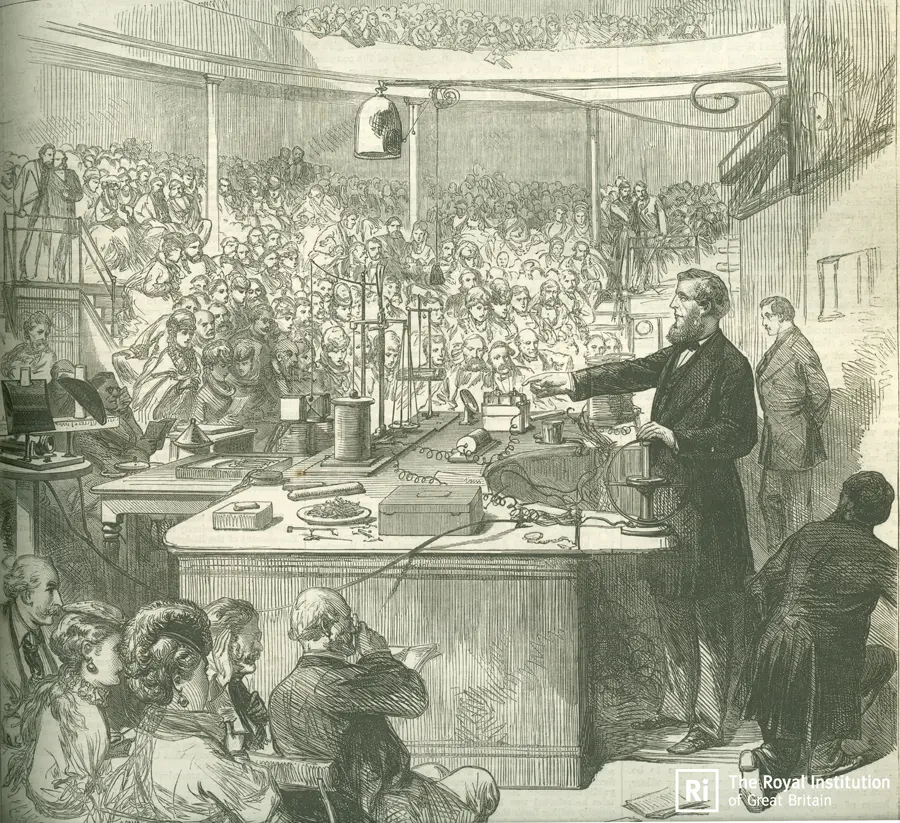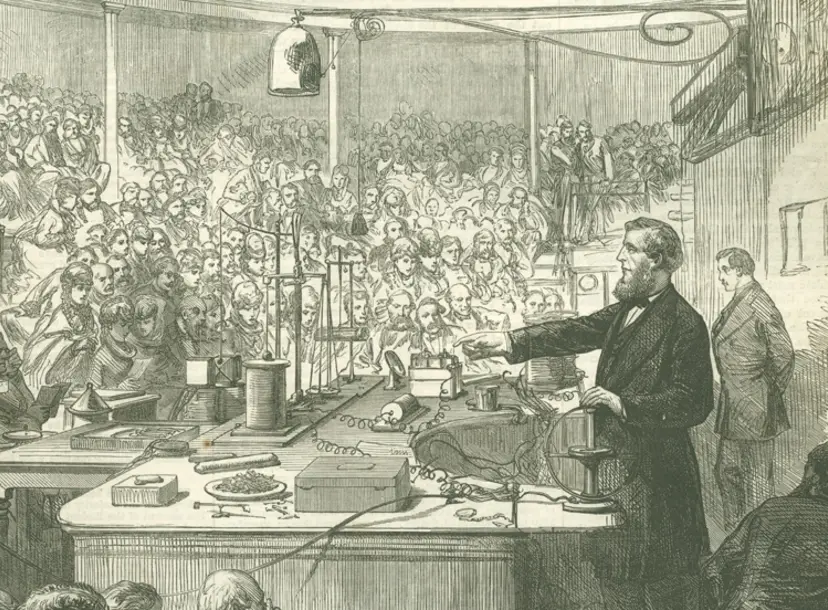Since its founding in 1799, the Royal Institution has been committed to connecting scientists and the public. Even before the term "scientist" was coined, we played a vital role in bringing scientific developments and discoveries to the general public. Such was the demand for leading-edge scientific insights in the early 1800s that the road outside our building on Albemarle Street became London's first one-way street, devised to manage the flood of visitors eager to learn.
The evolution of the Discourses:
This year marks the 200th anniversary of our Discourses, which began in 1825 as informal gatherings. Created to make the content of the lecture rather than the lecturer prominent, Discourses were developed so that new scientific discoveries or developments could be announced and demonstrated to a dedicated audience. However, from January 1826 their popularity quickly necessitated a shift to a more formal lecture format in our Theatre, to accommodate larger audiences.
Over time, the Discourses collected various traditions, one of which involved the lecturer entering the Theatre precisely as the clock struck the hour, speaking until the chimes signalled the end an hour later. Historically our Discourse speakers were always locked into a room 10 minutes before the start, as legend has it that a speaker once tried to escape.
While few managed to time it perfectly, one notable exception was Richard Owen in 1861, who, fuelled by his enthusiasm for establishing a "National Museum of Natural History," spoke for a staggering two hours. Regrettably, the content of his lecture remains unknown, as most Discourses from 1851 to 2001 were published as tidied-up records of the actual lectures, rather than academic papers.
For most of their history, they have occurred every Friday of the month, from October to June. Occasionally they have occurred on a Thursday, making the Ri the original home of the TED talk! In more recent times Discourses are now given once a month from September to June - but no longer always on a Friday.

Noteworthy Discourses:
Among the 3,000+ Discourses delivered at the Royal Institution, many stand out for their significance. On 25 January 1839, Michael Faraday delivered a Discourse where he publicly announced the existence of photography for the first time. Another momentous occasion occurred on 30 April 1897, when Joseph Thomson introduced the concept of the electron. Discourses also saw James Clerk Maxwell proving Faraday's theory of Lines of Force and showing the first colour image as the demo, Muybridge showing moving images for the first time in the UK, and Joseph Swan demonstrating the incandescent lightbulb. The list of innovations first demonstrated here at the Ri is endless.
Watch a recent Discourse from Yang-Hui He here:
Another discovery that was first talked about at the Royal Institution is the telephone. The first public lecture on the device was an Ri Discourse given by William Preece on 1 February 1878. Having some spare time at the end of his lecture, Preece started to talk about the recent invention of the Phonograph by Edison. He had a prototype of the device in the Theatre and was able to record Tyndall reciting poetry, and then play back the recording. This was the very first use of recorded sound in the UK!
A very controversial Discourse was given by British electrical engineer Eric Laithwaite in 1974, where he argued that the behaviour of gyroscopes violated the law of conservation of energy which had been established in the 1840s. The write-up of this Discourse failed peer review and was never actually published in the ‘Procedures of the Royal Institution’, although he still expressed his views in that year’s CHRISTMAS LECTURES. You can read more about that here, and watch the lecture in question here.
More recently, in 2013. Stephen Curry wrote an account of what it’s like to write and deliver a Discourse, and you can read it here in the Guardian.
Opening doors to women:
The Royal Institution has been an advocate for inclusivity in science, and the Discourses played a role in showcasing the contributions of women. In a historic moment, British archaeologist Joan Evans became the first woman to ever present at the Ri, giving a Discourse on 8 June 1923, titled "Jewels of the Renaissance." Since then, notable women like zoologist Jane Goodall, sustainable development pioneer Barbara Ward, and crystallography expert Kathleen Lonsdale have graced the stage, breaking barriers and inspiring future generations of female scientists.
Here's an account by a female scientist of what it was like to give a Discourse in 2015.
Watch Elizabeth's lecture here
Attending a Discourse:
To this day, the Royal Institution continues to host Discourses several times a year, although not exclusively on Friday evenings. We maintain the tradition of strict adherence to a one-hour time limit, marked by the ringing of a bell to conclude the Discourse. Although formal dress was once a firm tradition, today's audience members are encouraged to wear whatever makes them most comfortable, as part of our belief that science is for everyone – not just those who own a dinner jacket!
Joining the Discourse:
If you're intrigued by the Discourses, you can find upcoming events on the "What's on” page. For Ri Members and Patrons, attendance is completely free, offering one of the many benefits of becoming a member. To learn more and sign up, visit the Royal Institution's membership page and become a part of the enduring legacy of the Discourses.
Become an Ri member
And attend all our Discourses for free, as well as many other benefits including discounts on all our event tickets, and entry to the CHRISTMAS LECTURES ticket ballot.
Find out more